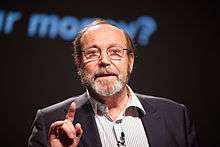Bernard Lietaer
Bernard Lietaer (7 February 1942 – 4 February 2019[1]) was a civil engineer, economist, author and professor. He studied monetary systems and promoted the idea that communities can benefit from creating their own local or complementary currency, which circulate parallel with national currencies.
Bernard Lietaer | |
|---|---|
 Bernard Lietaer in 2011 | |
| Born | 7 February 1942 |
| Died | 4 February 2019 (aged 76) |
| Occupation | Civil engineer, economist, author and professor |
Early life
Bernard Lietaer was born 7 February 1942 in Lauwe, Belgium, attended College of St Paul, Godinne from 1955–1961.[2] He studied engineering at the Catholic University of Leuven, in Belgium, where he later held an assistant professorship of international finance. During his engineering studies he was a member of the debating union Olivaint Conference of Belgium.[3] He left with a M.S. in 1967 to continue studies at MIT, United States until 1969.[2]
Career
Lietaer's post-graduate thesis published in 1971 included a description of "floating exchanges".[4] The Nixon Shock of that same year eradicated the Bretton Woods system by unhinging the US dollar value from its gold standard and inaugurated an era of "universal floating exchanges" (prior to that time the only "floating exchanges" involved some Latin American currencies) Litaer's thesis attracted the financial world's attention. The techniques which he had developed for marginal Latin American currencies were for a time the only systematic research which could be used to deal with the major currencies of the world. A major US bank negotiated exclusive rights to his approach which required that he begin another career.[5]
In 1987, he co-founded a large and successful currency management firm called GaiaCorp, and managed an offshore currency fund (Gaia Hedge II) which during the 1987-91 period was the world's top performing managed currency fund.[6] His biography cites the Micropal survey of 1,800 off-shore funds.[6]
In the preface to his book The Future of Money: Beyond Greed and Scarcity Lietaer wrote: "We almost tripled the money in three years".[7]
Business Week named him "the world’s top currency trader" in 1992.[8]
From 2003–2006, he was a visiting scholar at Naropa University, USA where he designed and implemented the University's Marpa Center for Business and Economics.[6] Litaer was also a research fellow at the Center for Sustainable Resources of the University of California, Berkeley.
While at the Central Bank in Belgium (National Bank of Belgium) he implemented the convergence mechanism (ECU) to the single European currency system. During that period, he also served as President of Belgium's Electronic Payment System.
In an 2007 interview, Lietaer claimed that diversified, internationally valid currencies can help "address specific needs and enable certain exchanges – whether to fight global warming, promote employment or facilitate education and health care."[9]
In 2012, he was the lead author with Christian Arnsperger, Sally Goerner and Stefan Brunnhuber of Money & Sustainability: the missing link,[10] a publication of The Club of Rome, in which he predicted that "the period 2007-2020 [would be] one of financial turmoil and gradual monetary breakdown."[11]
Personal Life and Death
At the time of his death, Lietaer lived in Brussels, Belgium.[1]
Bibliography
- The Future of Money (London: Random House, 2001)
- New Money for a New World (Qiterra Press 2011) (with Stephen Belgin)
- Hallsmith, Gwendolyn; Lietaer, Bernard (28 May 2011). Creating Wealth: Growing Local Economies with Local Currencies. New Society Publishers. ISBN 978-0-86571-667-4.
- People Money: The Promise of Regional Currencies (with Margrit Kennedy and John Rogers) (Triarchy Press 2012)
- Money and Sustainability: The Missing Link / A report from the Club of Rome (with Christian Arnsperger, Sally Goerner and Stefan Brunnhuber), Triarchy Press Ltd, 30. May 2012, ISBN 978-1908009777
- Rethinking Money: How New Currencies Turn Scarcity into Prosperity (with Jacqui Dunne) (Berrett-Koehler Publishers 2013), ISBN 978-1609942960
- With Helga Preuss, Marek Hudon, Kristof de Spiegeleer, Dieter Legat & Cary Sherburne: Towards a sustainable world. Delta Institute - Dieter Legat E.U. 2019, ISBN 978-3-2000-6527-7
Notes
- "Bancor Foundation announces death of president Bernard Lietaer". www.chepicap.com. Archived from the original on 7 February 2019. Retrieved 4 February 2019.
- Evory, Ann (15 November 1978). Contemporary Authors New Revision Series. ISBN 9780810300385.
- (german) Mein Weg ist Karma-Yoga, "Archived copy". Archived from the original on 14 July 2014. Retrieved 14 June 2014.CS1 maint: archived copy as title (link), KursKontakte. Retrieved 30 December 2013 2014
- "Library of Congress LCCN Permalink 74130275". Lccn.loc.gov. Retrieved 19 April 2018.
- "Bernard Lietaer's Beyond Greed and Scarcity: Preface". Transaction.net. Retrieved 6 December 2012.
- "Bernard A. Lietaer Professional Background". 2006. Archived from the original on 6 July 2007. Retrieved 26 December 2007.
- The Future of Money: Beyond Greed and Scarcity
- "ABOUT THE GLOBAL LEADERSHIP NETWORK, page 353" (PDF). Archived from the original (PDF) on 21 November 2008.
- Kamp, Jurriaan. "If we want a new world, we need new money" (Vol 5 Issue 6, July/August 2007). Ode Magazine. p. 87.
- Money & Sustainability: the missing link triarchypress.com
- "Money & Sustainability:the missing link" Archived 13 May 2013 at the Wayback Machine, News release [nd], The Club of Rome